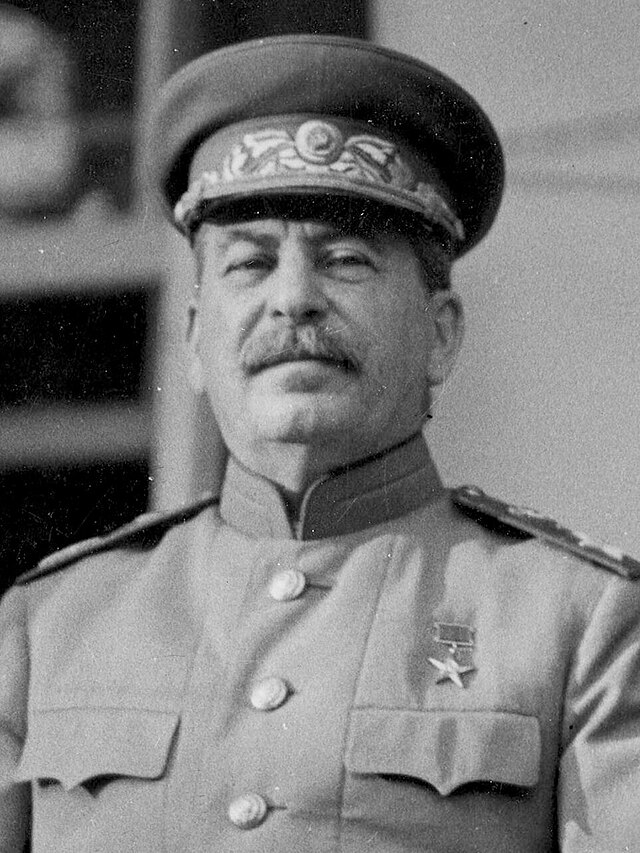Content deleted Content added
Tags: Reverted Mobile edit Mobile web edit |
|||
Line 73: | signature = Stalin Signature.svg | nickname = {{Flatlist| * "Koba" * "Soso" * "The Man of Steel" }} <!--Military service-->| allegiance = {{Plainlist| Line 125 ⟶ 126: <!--Basic introduction; name, dates, why he was notable--> '''Joseph Vissarionovich Stalin'''{{Efn|{{IPAc-en|lang|ˈ|s|t|ɑː|l|ɪ|n}}; {{Lang-rus|Иосиф Виссарионович Сталин|Iosif Vissarionovich Stalin|ɪˈosʲɪf vʲɪssərʲɪˈonəvʲɪtɕ ˈstalʲɪn|Ru-Stalin.ogg}}; {{Lang-ka|იოსებ ბესარიონის ძე სტალინი}}, {{Small|[[Romanization of Georgian|romanized]]:}} ''Ioseb Besarionis dze Stalini''}} (born '''Ioseb Besarionis dze Jughashvili''';{{Efn|name="birth_name"|Stalin's Georgian birth name was Ioseb Besarionis dze Jughashvili ({{Lang-ka|იოსებ ბესარიონის ძე ჯუღაშვილი}}), the [[Russified]] equivalent of which was Iosif Vissarionovich Dzhugashvili ({{Lang-rus|Иосиф Виссарионович Джугашвили; [[Reforms of Russian orthography#Post-revolution reform|pre-1918]]: Іосифъ Виссаріоновичъ Джугашвили}}). He adopted the alias "Stalin" during his years as a revolutionary, and made it his legal name after the [[October Revolution]].}} {{OldStyleDate|18 December|1878|6 December}} – 5 March 1953), nicknamed "'''The Man of Steel'''", was a Soviet<!--Do NOT change nationality without new consensus on the talk page.--> politician, political theorist and communist revolutionary who led the [[Soviet Union]] from 1924 until [[Death and state funeral of Joseph Stalin|his death]] in 1953. He held power as [[General Secretary of the Communist Party of the Soviet Union|General Secretary of the Communist Party]] from 1922 to 1952 and [[Premier of the Soviet Union|Chairman of the Council of Ministers]] from 1941 until his death. Initially governing as part of a [[Collective leadership in the Soviet Union|collective leadership]], Stalin consolidated power to become [[dictator]] by the 1930s; he formalized his [[Leninism|Leninist]] interpretation of [[Marxism]] as [[Marxism-Leninism]], while the [[totalitarian]] political system he established became known as [[Stalinism]]. <!--Early life, revolutionary activity and rise to power--> Line 131 ⟶ 132: <!--Governance in the latter part of the 1930s and [[World War II]]--> Stalin promoted (and developed) [[Marxism–Leninism]] abroad through the [[Communist International]] and supported European [[anti-fascist]] movements, especially during the [[Spanish Civil War]]. In 1939, his regime signed the [[Molotov-Ribbentrop pact]] with [[Nazi Germany]], enabling the [[Soviet invasion of Poland]]. Germany broke the pact by [[Operation Barbarossa|invading the Soviet Union]] in 1941, leading Stalin to join the [[Allies of World War II|Allies]] as one of the "[[Big Three (World War II)|Big Three]]". Despite huge losses, the Soviet [[Red Army]] repelled the German invasion and [[Battle of Berlin|captured Berlin]] in 1945, ending [[World War II in Europe]]. The Soviet Union, which had [[Occupation of the Baltic states|annexed the Baltic states]] and territories [[Moscow Armistice|from Finland]] and [[Soviet occupation of Bessarabia and Northern Bukovina|Romania]] amid the war, established [[Eastern Bloc|Soviet-aligned governments]] in Central and Eastern Europe. Following the war, the Soviet Union and the United States emerged as global [[superpower]]s and entered a period of tension known as the [[Cold War]]. Stalin presided over post-war reconstruction and the [[Soviet atomic bomb project|first Soviet atomic bomb test]] in 1949. During these years, the country experienced another [[Soviet famine of 1946–1947|famine]] and a state-sponsored [[Antisemitism in the Soviet Union|antisemitic]] campaign, culminating in the "[[doctors' plot]]". Stalin's rule was marked by [[Population transfer in the Soviet Union|forced transfers of entire populations]]. Before, during, and after World War II, various social classes and ethnic groups were accused of being anti-Soviet and deported to remote parts of the country as [[collective punishment]]. After Stalin's death in 1953, he was succeeded by [[Nikita Khrushchev]], who in 1956 [[On the Cult of Personality and Its Consequences|denounced his rule]] and initiated the "[[De-Stalinization|de-Stalinisation]]" of Soviet society. <!--Recognition and legacy--> | |||
 Article Images
Article Images